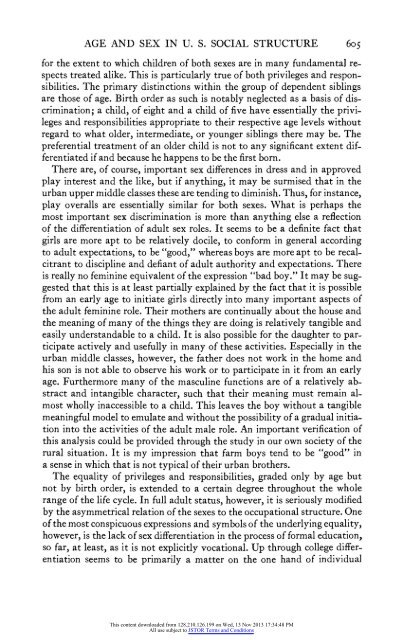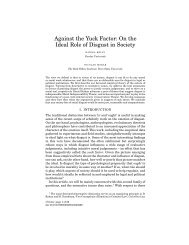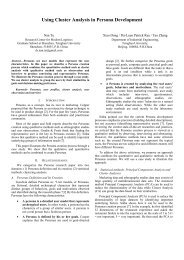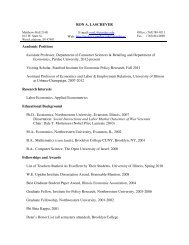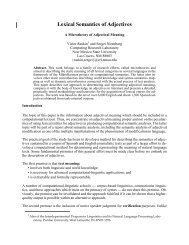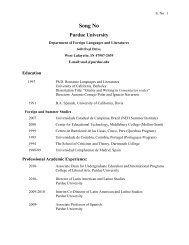Parsons 1942 - Career Account Web Pages
Parsons 1942 - Career Account Web Pages
Parsons 1942 - Career Account Web Pages
You also want an ePaper? Increase the reach of your titles
YUMPU automatically turns print PDFs into web optimized ePapers that Google loves.
AGE AND SEX IN U. S. SOCIAL STRUCTURE<br />
for the extent to which children of both sexes are in many fundamental respects<br />
treated alike. This is particularly true of both privileges and responsibilities.<br />
The primary distinctions within the group of dependent siblings<br />
are those of age. Birth order as such is notably neglected as a basis of discrimination;<br />
a child, of eight and a child of five have essentially the privileges<br />
and responsibilities appropriate to their respective age levels without<br />
regard to what older, intermediate, or younger siblings there may be. The<br />
preferential treatment of an older child is not to any significant extent differentiated<br />
if and because he happens to be the first born.<br />
There are, of course, important sex differences in dress and in approved<br />
play interest and the like, but if anything, it may be surmised that in the<br />
urban upper middle classes these are tending to diminish. Thus, for instance,<br />
play overalls are essentially similar for both sexes. What is perhaps the<br />
most important sex discrimination is more than anything else a reflection<br />
of the differentiation of adult sex roles. It seems to be a definite fact that<br />
girls are more apt to be relatively docile, to conform in general according<br />
to adult expectations, to be "good," whereas boys are more apt to be recalcitrant<br />
to discipline and defiant of adult authority and expectations. There<br />
is really no feminine equivalent of the expression "bad boy." It may be suggested<br />
that this is at least partially explained by the fact that it is possible<br />
from an early age to initiate girls directly into many important aspects of<br />
the adult feminine role. Their mothers are continually about the house and<br />
the meaning of many of the things they are doing is relatively tangible and<br />
easily understandable to a child. It is also possible for the daughter to participate<br />
actively and usefully in many of these activities. Especially in the<br />
urban middle classes, however, the father does not work in the home and<br />
his son is not able to observe his work or to participate in it from an early<br />
age. Furthermore many of the masculine functions are of a relatively abstract<br />
and intangible character, such that their meaning must remain almost<br />
wholly inaccessible to a child. This leaves the boy without a tangible<br />
meaningful model to emulate and without the possibility of a gradual initiation<br />
into the activities of the adult male role. An important verification of<br />
this analysis could be provided through the study in our own society of the<br />
rural situation. It is my impression that farm boys tend to be "good" in<br />
a sense in which that is not typical of their urban brothers.<br />
The equality of privileges and responsibilities, graded only by age but<br />
not by birth order, is extended to a certain degree throughout the whole<br />
range of the life cycle. In full adult status, however, it is seriously modified<br />
by the asymmetrical relation of the sexes to the occupational structure. One<br />
of the most conspicuous expressions and symbols of the underlying equality,<br />
however, is the lack of sex differentiation in the process of formal education,<br />
so far, at least, as it is not explicitly vocational. Up through college differentiation<br />
seems to be primarily a matter on the one hand of individual<br />
6o5<br />
This content downloaded from 128.210.126.199 on Wed, 13 Nov 2013 17:34:48 PM<br />
All use subject to JSTOR Terms and Conditions


